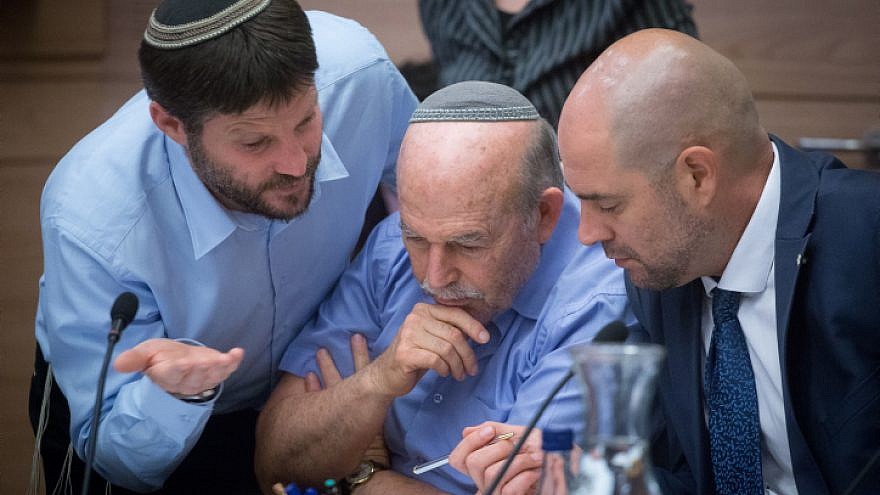Israel’s controversial nationality bill will move ahead for second and third readings in the Knesset, after receiving approval from a special Knesset committee.
The vote was taken from members of the House Committee and the Constitution, Law and Justice Committee, and passed in a vote of 8-7.
Voting against were Joint List Knesset members Ahmad Tibi and Yousef Jabareen; Meretz MK Michal Rozin; Zionist Union MKs Yoel Hasson, Eitan Broshi and Merav Michaeli; and Yesh Atid MK Yael German.
The committee erupted in shouting following the meeting, with Tibi yelling in Arabic, and some right-wing MKs arguing that Arabs have 22 countries while the Jews have just one.
Tibi called the vote “the death of democracy,” while Dichter said the law was an opportunity to “decide in law whether Israel is the nation-state of the Jewish people.”
The legislation includes language enshrining Shabbat and Jewish holidays as official days of rest in the country, though allowing for non-Jews to determine their own rest days and holidays.
Contention over wording pertaining to the official allowance of the creation of Jewish-only towns threatened to derail the legislation, but was satisfactorily amended to say that “the state considers the development of Jewish settlement a national value and will act in order to encourage and promote the foundation and establishment of such settlement.”
Included in the legislation are Israel’s state symbols, the establishment of Jerusalem as the capital of Israel and Hebrew as Israel’s official language, and the right of return for Jews living in the Diaspora, as well as the utilization of democracy as Israel’s state democratic process.
What follows is a full translation of the final version of the bill approved by the Knesset plenary:
Basic Law: Israel as the Nation State of the Jewish People
1 — Basic principles
A. The land of Israel is the historical homeland of the Jewish people, in which the State of Israel was established.
B. The State of Israel is the national home of the Jewish people, in which it fulfills its natural, cultural, religious and historical right to self-determination.
C. The right to exercise national self-determination in the State of Israel is unique to the Jewish people.
2 — The symbols of the state
A. The name of the state is “Israel.”
B. The state flag is white with two blue stripes near the edges and a blue Star of David in the center.
C. The state emblem is a seven-branched menorah with olive leaves on both sides and the word “Israel” beneath it.
D. The state anthem is “Hatikvah.”
E. Details regarding state symbols will be determined by the law.
3 — The capital of the state
Jerusalem, complete and united, is the capital of Israel.
4 — Language
A. The state’s language is Hebrew.
B. The Arabic language has a special status in the state; Regulating the use of Arabic in state institutions or by them will be set in law.
C. This clause does not harm the status given to the Arabic language before this law came into effect.
5 — Ingathering of the exiles
The state will be open for Jewish immigration and the ingathering of exiles
6 — Connection to the Jewish people
A. The state will strive to ensure the safety of the members of the Jewish people in trouble or in captivity due to the fact of their Jewishness or their citizenship.
B. The state shall act within the Diaspora to strengthen the affinity between the state and members of the Jewish people.
C. The state shall act to preserve the cultural, historical and religious heritage of the Jewish people among Jews in the Diaspora.
7 — Jewish settlement
A. The state views the development of Jewish settlement as a national value and will act to encourage and promote its establishment and consolidation.
8 — Official calendar
The Hebrew calendar is the official calendar of the state and alongside it the Gregorian calendar will be used as an official calendar. Use of the Hebrew calendar and the Gregorian calendar will be determined by law.
9 — Independence Day and memorial days
A. Independence Day is the official national holiday of the state.
B. Memorial Day for the Fallen in Israel’s Wars and Holocaust and Heroism Remembrance Day are official memorial days of the State.
10 — Days of rest and sabbath
The Sabbath and the festivals of Israel are the established days of rest in the state; Non-Jews have a right to maintain days of rest on their Sabbaths and festivals; Details of this issue will be determined by law.
11 — Immutability
This Basic Law shall not be amended, unless by another Basic Law passed by a majority of Knesset members.























